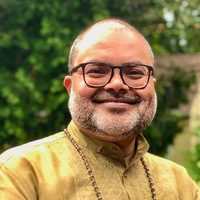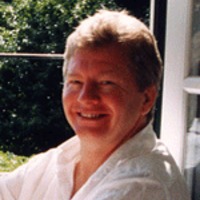
B. Venkat Mani
University of Wisconsin-Madison, Institute for Regional and International Studies (IRIS), Faculty Member
University of Wisconsin-Madison, Center for the History of Print and Digital Cultures, Faculty Member
University of Wisconsin-Madison, Institute for Research in the Humanities, Race, Ethnicity, and Indigeneity Senior Fellow (2021-25)
https://gns.wisc.edu/staff/mani-b-venkat/
Phone: +1 608 262-2192 (German Department)
Address: Department of German
University of Wisconsin-Madison
818 Van Hise Hall, 1220 Linden Drive
Madison WI 53706 USA
Phone: +1 608 262-2192 (German Department)
Address: Department of German
University of Wisconsin-Madison
818 Van Hise Hall, 1220 Linden Drive
Madison WI 53706 USA
less
Related Authors
Noel B. Salazar
KU Leuven
Josiah Heyman
University of Texas at El Paso (UTEP)
Dominik Wujastyk
University of Alberta
James Mallinson
University of Oxford
Nina Glick Schiller
The University of Manchester
Julia Hell
University of Michigan
Didier COSTE
Université Bordeaux-Montaigne
Carson T. Schütze
University of California, Los Angeles
Giovanna Pinna
Università del Molise
Manfred Malzahn
United Arab Emirates University
InterestsView All (14)










Uploads
Papers by B. Venkat Mani
the ancient and the classical are particularly suited to augment the role
of libraries as sociopolitical texts; the collector and the collected, the
consumer and the consumed, the object and the subject undergo various
transformations.
the ancient and the classical are particularly suited to augment the role
of libraries as sociopolitical texts; the collector and the collected, the
consumer and the consumed, the object and the subject undergo various
transformations.
shifts of financial and political powers from old centers of the West to new and rising global powers such as China and India cannot sustain a derivative idea of progress and development. Conrad proposes a “relational” model of global history, which underlines that “a historical unit—a civilization, a nation, a family—does not develop in isolation” (65).
The essays published in this special issue of Monatshefte
augment this relational model. Instead of examining the German cultural
space in isolation, these essays study “Germany” in relation to other geopolitical units. The authors engage with different incarnations of the tensions between nationalism and cosmopolitanism, as well as between universalism and particularism, both retrospectively and prospectively. Through a relational— rather than an essentialist—comparison, the essays in this collection open up multiple, mutually entangled lines of inquiry. These essays were first presented at the 47th Wisconsin Workshop, “Measuring the ‘World’: Formation, Transformation and Transmission of the ‘National’ and the ‘Universal’ from the Eighteenth Century to the Present” at the University of Wisconsin–Madison. The purpose of the workshop was to conduct an interdisciplinary inquiry of concepts, structures, and terms used widely in literature, music, visual and performing arts, history, political science, geography, and sociology, and to locate stations of their growth and development, first within and then beyond Germany. The concepts, structures, and movements the workshop examined were all products of specific historical
and cultural moments in German history, when a cosmopolitan orientation to the world was emerging parallel to a focused investment in a cultural organization around the German language, arts, and dissemination of knowledge. The papers, some of which are included here, explored Germany’s role as scientific and artistic power-broker and scrutinized the political, cultural, and moral dimensions of the numerous ways the world can be measured, giving rise to the following questions: How was Germany’s conceptualization of the world politically charged and historically conditioned? How and why did Germany become a forerunner in the ways of conceptualizing the world? What are the positive and negative legacies of the modes of situating the Self and the Other in German intellectual history? How do historical contingencies and political realities impact the origins and proliferation
of conceptual terms and frameworks in transnational contexts?
Mani argues that the proliferation of world literature in a society is the function of a nation's relationship with print culture--a Faustian pact with books. Moving from early Orientalist collections, to the Nazi magazine Weltliteratur, to the European Digital Library, Mani reveals the political foundations for a history of world literature that is at once a philosophical ideal, a process of exchange, a mode of reading, and a system of classification.
Shifting current scholarship's focus from the academic to the general reader, from the university to the public sphere, Recoding World Literature argues that world literature is culturally determined, historically conditioned, and politically charged.
Moving deftly from the theoretical literature to the texts themselves, Mani's groundbreaking study explores these conflicts and dialogues and the resulting cultural hybridization as they are expressed in four novels that document the complexity of Turkish-German cultural interactions in the late twentieth and early twenty-first centuries. His innovative readings will engage students of contemporary German literature as well as illuminate the discussion of minority literature in a multicultural setting.
As Salman Rushdie said in the 2002 Tanner Lecture at Yale, "The frontier is an elusive line, visible and invisible, physical and metaphorical, amoral and moral. . . . To cross a frontier is to be transformed." It is in this vein that Mani's dynamic and subtle work posits a still evolving discourse between Turkish and German writers.